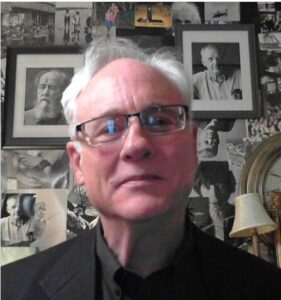Houston, TX. My mother was next to the youngest of eight children, and I’m the youngest of five. That means I didn’t get to know my maternal grandparents very well, but the memories they gave me still linger.
My grandma and grandpa Autry were sharecroppers who left the dust-bowl of Oklahoma for the promising soil of the Salinas valley. John Steinbeck told their story in his epic novel, The Grapes of Wrath. There is a black and white photo on my wall that shows a weather worn angular man in felt hat and overalls standing in black plowed dirt with his sturdy wife and eight children. A picture is indeed worth a thousand words.
I’m not sure why, but one of my earliest memories is of my grandparent’s washing machine. It was a tub on four legs, with a wringer on top that looked like two rolling pins laid sideways, powered by an electric motor. Grandma and mama talked while lifting wet clothes from the tub, guiding them through the wringer and dropping them in the basket on the floor. And when the tub was finally empty, mother and daughter hung the clothes on the wire strung between two posts in the yard. Then they waited for them to dry.
Though few, memories of my grandparents still linger. I will long remember their kitchen. A meal might consist of pork chops from a hog slaughtered last fall, green-beans and new potatoes that were grown, gathered and canned the year before, and black berries that were picked that evening. Like washing clothes, preparing food took time; it took work; it was a family affair. And eating was no different. There were no T.V. trays in my grandparent’s home. They didn’t own a T.V. To eat anywhere but my grandmother’s table would have been unthinkable. So, we gathered there and communed.
But things changed for my grandpa and grandma. One by one their children left to pursue a better life in the city. By the spring of 1966 they were all gone. That’s when my grandfather’s health failed him. He fell and broke his hip, and on June 6th he died, leaving my grandmother alone in her empty house. The Baptist church did what all small town churches do. They cooked for her and they loved her. But it was not the same.
I still remember the phone calls. “Bess (that’s what she called my mother), will you come see me? This house sure gets lonely.” I listened from beneath the table as my mother sighed plaintively. It was an hour drive to my grandmother’s and my mother had just finished a twelve hour shift at the plant. “Oh moma I’ve been so busy. They’ve had us working overtime and . . .” My mother was being pulled in two directions. A forgotten past was wooing her to the place of remembrance, but her new home was in the city.
In April of 1966 a Time Magazine cover asked, “Is God Dead?” In November, the Bishops of the Roman Catholic Church said the faithful could eat meat on Fridays. And in December, CBS aired for the first time, Dr. Seuss’ “How the Grinch Stole Christmas.”
In 1966, my grandma didn’t put up a Christmas tree. She didn’t bake pies. And she didn’t make fudge. Her kitchen was silent. I believe it was her way of mourning, not just the loss of her husband to the grave, but the loss of her children to schedules that kept them so busy they had no time for visiting and storytelling.
I have recollection of these things because I was never far from my mother’s knee. Even as a child, I knew something sacred was happening when the family came together. While quietly watching at the wash tub and the family table, I underwent a rite a passage. I received something that cannot be explained with words. It can only be lived in the community that gave it.
So, today I have knowledge that comes to the person who pauses long enough to be embraced by a shared history. That history and those people nourish me as I rush through this life, texting and emailing, microwaving and overnighting, forever searching for time saving devices to make my life easier, so I can spend more time with those I love.
—
Fr. Doug Sangster lives with his wife in Houston, Texas, where he lives the common life with his parish, Holy Trinity Anglican Church.







13 comments
Doug Sangster
Rob: Ever listen to the audio magazine, Mars Hill Audio? Terrific interviews about topics like this.
Rob G
“I have long thought that the more connected we become electronically, the more distant we become personally”
For a great study along these lines, see Dale Allison’s little book “The Luminous Dusk” (an earlier version was called “The Silence of Angels”). He looks at such things as the ubiquity of artificial light and noise and the modern lack of a sense of wonder, which distance us from the natural world and from each other.
Doug Sangster
Camille, I have long thought that the more connected we become electronically, the more distant we become personally. Considering the arid condition you and Borgmann describe above, it’s little wonder we crave genuine community. Thanks for your post.
Camille Josey
Doug:
I have similar memories: of a washtub on four legs, wringer on top, taking up a large part of my own grandmother’s back porch. And I remember dinner tables laden with food and the family (mom, dad, siblings, aunts, uncles, cousins) gathered not just for the eating, but in meal preparation, followed by the meal itself flavored with lingering conversations.
Philosopher Albert Borgmann (Power Failure) talks about “focal things” vs. technological “devices” … he speaks of the leisurely meal which you and I recollect from our grandmothers’ homes as a “focal thing.” The meal required shopping at the market, conversations with the grocer, then various members of the family gathered in the kitchen as we chopped and mixed and baked and fried, children who participated in the process by setting the table and hanging around the kitchen to lick the batters and sneak a taste, and then the splashing and play as we cleaned up afterwards. The whole process promoted conversations and the interaction that take place as a result of the “focal thing.” A technological “device” on the other hand is meant to maximize efficiency and eliminate all of the prep work – ready-made meals, for example, and the microwave oven. One of the central characteristics of a “device”, says Borgmann, is that it unburdens us from all of that time-consuming work of shopping and meal preparation. What devices rob us of, Borgmann contends, are the “focal practices” demanded by “focal things” – the routine ways in which we engage the larger world in our daily lives.
In my own immediate family, meals were sacrosanct. No matter what, we were to be home for dinner time. Some of my fondest memories of childhood are from meals that would last 2 hours or more as my father and mother caught up on what was going on in our lives (and there was a lot of catching up with seven children), when Dad would challenge us with new words to spell and define, or offer a prize to the first to build a motor, or solve a math puzzle (always elaborate word problems). When we gather as a family we still linger in preparation and in conversation around the dinner table.
Several years ago I remember a public service announcement encouraging parents to gather their children for dinner once a week – and nearly weeping at the poverty of that picture. I am not a luddite (far from it). But we must pay more attention to the things we give up for the sake of the convenience brought by those technological “devices.” Rites of passage (and the communities that live them), are more important than mere convenience.
Doug Sangster
“Everyone was always there as if it were impossible for them to be anywhere else.”
Your post blessed me, and made me pine all the more for genuine community, David. Volumes are written in the line above. Before I visit your site I have to ask, have you read Wendell Berry?
Jenni
What a lovely article, Fr. Doug! So well done and beautiful.
David
When I was young, I was lucky enough to be the child of two parents who were both the eldest of several. I knew my great-grandparents (on both sides briefly) and all my grandparents (through high school), 4th of July, Thanksgiving, Christmas at least (often more times) we could have more than 25 people in our house (from both sides).
Everyone was always there as if it were impossible for them to be anywhere else. A rare illness struck, but was never over cause for concern. Everyone said that for about 30 years there, the family Churched together, recreated/vacationed together and was probably never more than 35 mins apart.
And then the wind blew it all away. Folks died, moved, converted to different churches, busied themselves endlessly with nothing, married, got divorced. By the time my own son passed away from cancer a couple of years ago, no one could even make it to the funeral.
My wife and I sometimes sit in our living room, feeling like Adam and Eve. The only people in the world, starting all over. Dislocated from Eden and barred by swords of flame. Breaks my heart in a way that whiskey can’t fix.
Thank you for writing this today.
Jordan Smith
Great contribution. Thank you.
John Médaille
Doug, I too remember my mother’s wringer wash-tub which tells you how old I am. What I chiefly remember is playing around with it and getting my hand caught in the wringer. More frightening than painful. We had just moved from New York City to Los Angeles, and the washing machine (along with the rented house, rather than an apartment) was just one of those mod-cons that Californians seemed to have in abundance.
Doug Sangster
Matt, while I have not experienced what you are going through, I have heard the story so many times I feel as I though I have. I yearn and pine for the day when all Anglicans are of one fold, confessing the same faith. God bless you in the journey.
Doug Sangster
These are exquisite lines Seth. Thanks for sharing them. Do I detect an appreciation for Wendell Berry in your post?
“I make to it an annual visit I carry my children to it and teach them the hardships endured by the generations which have gone before them. I love to dwell on the tender recollections, the kindred ties, the early affections and the touching narratives and incidents which mingle with all I know of this primitive family abode. he name of my posterity be blotted forever from the memory of mankind!”
Mark Perkins
This is beautiful.
(I am also Anglican, though I am at the moment attending a relatively conservative Episcopal parish. I spend every Sunday weighing whether I can continue going. By the fall, I hope to be at a traditional parish using the ’28).
Seth
Thank you for this Fr. Sangster. I am also a traditional Anglican keeping “the faith which was once for all delivered to the saints” and believe this faith (love,charity) is demonstrated most obviously in our relations with others, especially with our family. In the long list of destructive habits of post-modern Economic Man, the abandonment of familial/ancestral ties might very well be the most frightening. The system by which Americans are “educated” is completely dependent on leaving the family home and hometown to be loaded with debt and brainwashed to love the trivial toys of a morally bankrupt wasteland. Your story brings to light the oft-forgotten pain and suffering of those who know how to love.
Read the first four paragraphs at this link to see what the “log cabin” came to mean in relation to this discussion over 100 years ago. Daniel Webster’s opening quotation is especially relevant: http://www.daytonhistorybooks.com/page/page/1571350.htm
Comments are closed.